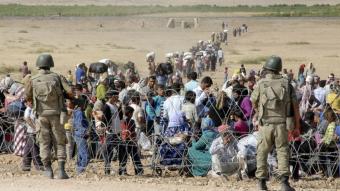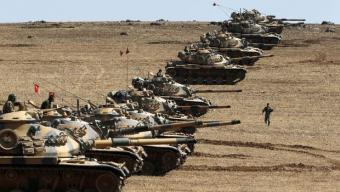Duality of US Role in Syria's Kurdish Region
 This resourceful depiction by Foreign Policy online magazine is by far the best in its kind in exploring the political dynamics and landscape in Syria’s Kurdistan and the US involvement with the actors in the region.
This resourceful depiction by Foreign Policy online magazine is by far the best in its kind in exploring the political dynamics and landscape in Syria’s Kurdistan and the US involvement with the actors in the region.
As the Islamic State terrorists continue to consolidate territories in Iraq and Syria, and as the fight for Kobane reaches the town’s center, the lack of US and allies direct role and support raises many questions.
Written by Jake Hess and titled:”Washington’s Secret Back-Channel Talks With Syria’s Kurdish ‘Terrorists'”, the piece attempts to unfold trails of talks between the US and various Syrian Kurdish opposition groups, namely the PYD and the KNC.
The report details Washington’s efforts to bring the Kurdish National Congress of Syria under the auspice of the Syrian National Council with some degrees of success. It also refers to some clandestine contacts between the ruling PYD, or Democratic Union Party, and US officials, and more extensive official meetings with the KNC; however, it seems that there has been little or no effort by the US officials to mediate between the PYD and the KNC, primary source of divisions in the area.
In my view, if the US had tried to close the gaps between the PYD and the various Kurdish forces in the KNC, we would probably had not witnessed ISIS advances on the Kurdish territories to this extent.
For better or worse, many in the Kurdish areas of Syria do not overwhelmingly recognize the PYD rule over the territories, and for that matter many Kurds, including the Kurdistan Regional Government, have been hesitant to pitch in support, critical of party’s unilateral rule.
 The region is volatile and Kurdistan and the Kurdish territories lie in the middle of all these. The Kurds in all parts of Kurdistan are as pro-western and open as you can find in the region; however, Kurdistan political landscape is also as diverse and fractious as it can get. The case of US involvement with Iraq’s Kurds prove that it is imperative for the US to well understand the geo-political realities in all parts of Kurdistan and use the political clout at its disposal to promote tolerance and multi-lateralism. This will also have a domino effect on the neighbouring countries such as Turkey and Iraq to respect the status-quo on Kurds propagated by Washington.
The region is volatile and Kurdistan and the Kurdish territories lie in the middle of all these. The Kurds in all parts of Kurdistan are as pro-western and open as you can find in the region; however, Kurdistan political landscape is also as diverse and fractious as it can get. The case of US involvement with Iraq’s Kurds prove that it is imperative for the US to well understand the geo-political realities in all parts of Kurdistan and use the political clout at its disposal to promote tolerance and multi-lateralism. This will also have a domino effect on the neighbouring countries such as Turkey and Iraq to respect the status-quo on Kurds propagated by Washington.
The dreadful events in Kobane teach us many lessons with far-reaching implications: US and allies need to have pro-active and unique policy vis-a-vis the Kurds rather than a last minute approach that often requires desperate measures, be it in Iraq, Turkey, Iran or Syria. Regardless, the Kobane situation is desperate that requires desperate measures. US must actively engage and pressure Turkey to do the same as well, and work on a dual-track policy of military and logistical assistance in the air and on the ground, and political reconciliation between the PYD and the KNC. This will certainly help in shifting away the PYD and its sister party PKK from the US adversaries and resuscitate PKK/Turkey rapprochement as well.
Sharif Behruz is a Kurdish-Iranian political blogger and commentator on Middle Eastern affairs focusing on Kurdish and Iranian affairs. He is the co-founder and President of Iran Roundtable, an Iranian-American advocacy organization.
